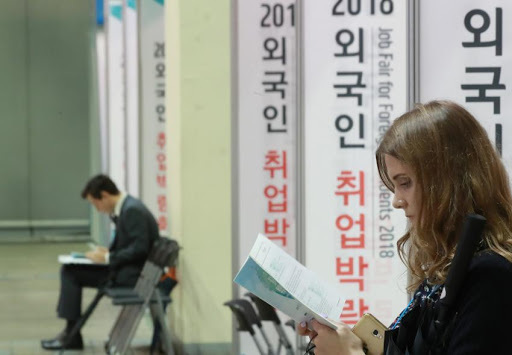Residency visa rule changes ‘nothing to do with the COVID-19’: Justice Ministry
Justice Ministry says the F-2-7 visa rule changes are meant to selectively invite high-income, outstanding foreign talents to stay in Korea
By Ock Hyun-juPublished : July 22, 2020 - 17:00

Changes made to the points-based residency visa requirements, which will go into effect Dec. 1, are meant to advantage a “superior pool of foreigners” and to mitigate the negative impact of the “overuse” of low-income foreign workers on the South Korean labor market, the Ministry of Justice said Wednesday.
The newly revised rules for the F-2-7 visa, which the ministry announced in a public notice on July 7, include a dramatic increase in the number of points to be awarded on the basis of income. Another major change is the exclusion of current E-7-4 visa holders from F-2-7 candidates.
Many expats who have prepared for years to apply for the residency visa, or hope to renew it, took issue with such drastic changes being made on short notice as well as with the timing -- given that many are struggling to keep their income and their jobs during the COVID-19 pandemic.
In an email response to The Korea Herald’s inquiries, the ministry said it had been planning to make those changes since 2015 and that they have nothing to do with COVID-19.
“We have raised the cap on points awarded on the basis of income (from the current 10 points to 60 points) in order to select and prefer a high-income, superior workforce,” said the ministry, dismissing calls that this is “unfair” to those earning less money.
Currently, the highest number of points one can earn for income is 10 -- given to those who earn 100 million won ($83,496) or more per year -- but after the new rules go into effect, that will change to 60. Those with annual income of 100 million won or more will now get 60 points, while those who earn less than 30 million won will get 10 points.
“We had received a lot of feedback about the increased points for the income section making it easier to get the F-2-7 visa,” the ministry said.
All foreign nationals seeking to switch to the F-2-7 visa would benefit from the raised points for the income criteria. Those earning less than 30 million won receive up to two points under the current rules, but can earn 10 points under the revised rules, for example, the ministry said.
As for other categories, 25 points are awarded based on age, 25 based on education level, up to 20 based on Korean language proficiency and the KIIP, and 40 more based on other criteria. Up to 80 points can be deducted from those with criminal records or records of past immigration law violations.
A minimum of 80 points guarantees an F-2-7 visa, although the duration of stay allowed varies depending on the number of points.
Designed to attract a “superior pool of foreigners,” the F-2-7 visa allows its holders to stay in the country for as long as five years, with freedom to choose and change jobs and workplaces without being tied to their employers.
This is why many D and E visa holders have sought to switch to the visa by taking Korean language courses, doing voluntary work and signing up for academic degrees here, among other efforts. As of 2018, about 41,000 foreigners were staying here on the visa.
Asked why those holding E-7-4 visas will no longer be eligible to apply for the F-2-7, the ministry said it is to protect the country’s labor market and jobs for locals.
“We revised the rule to minimize a negative impact on the labor market, which is brought by an overuse of low-income foreign workforce,” said the ministry. If E-7-4 visa holders get more freedom to choose their jobs, they could access industries where competition for jobs with locals is tough, such as the construction sector, and could end up stealing jobs from them, it added.
The E-7-4 visa system is to help the manufacturing, agricultural, farming and fishing industries stably address labor shortages, which means only those agreeing to remain employed in those sectors can have their visas extended for a long-term stay, the ministry said.
“If the E-4-7 visa holders get F-2 visas, which does not confine the visa holders’ jobs to certain sectors, it is highly possible they can enter competitive industries, such as the construction industry, where competition with locals is tough.”
Regarding some expats’ complaints that the ministry did not reflect their feedback, the ministry said it had more than 500 replies to an administrative notice on its website in May and partially reflected them in the finalized version it put up on July 7.
To minimize confusion, those who apply for the visa before the new rules come into effect are subject to the current rules. Those who already hold an F-2 visa can renew it under the current rules for the next year, it explained.
The revised rules for the F-2-7 visa are now available on the national law information center’s website (www.law.go.kr.)
A translated version of key points of the revised rules for the residency visa will be uploaded on the Korea Immigration Service’s website (www.immigration.go.kr) as well as Hi Korea’s website (www.hikorea.go.kr) in the near future, the ministry said.
(laeticia.ock@heraldcorp.com)
-
Articles by Ock Hyun-ju








![[Graphic News] More Koreans say they plan long-distance trips this year](http://res.heraldm.com/phpwas/restmb_idxmake.php?idx=644&simg=/content/image/2024/04/17/20240417050828_0.gif&u=)
![[KH Explains] Hyundai's full hybrid edge to pay off amid slow transition to pure EVs](http://res.heraldm.com/phpwas/restmb_idxmake.php?idx=644&simg=/content/image/2024/04/18/20240418050645_0.jpg&u=20240419100350)






![[From the Scene] Monks, Buddhists hail return of remains of Buddhas](http://res.heraldm.com/phpwas/restmb_idxmake.php?idx=652&simg=/content/image/2024/04/19/20240419050617_0.jpg&u=20240419175937)

![[KH Explains] Hyundai's full hybrid edge to pay off amid slow transition to pure EVs](http://res.heraldm.com/phpwas/restmb_idxmake.php?idx=652&simg=/content/image/2024/04/18/20240418050645_0.jpg&u=20240419100350)

![[Today’s K-pop] Illit drops debut single remix](http://res.heraldm.com/phpwas/restmb_idxmake.php?idx=642&simg=/content/image/2024/04/19/20240419050612_0.jpg&u=)